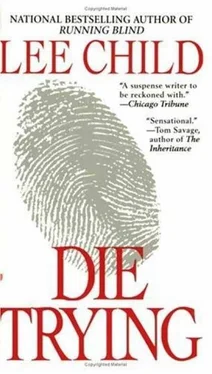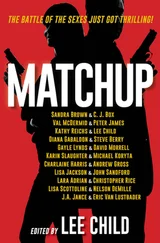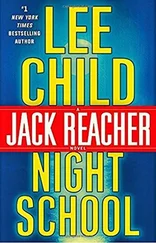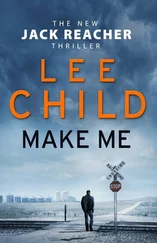FOR THE FIRST time in twenty years, General Garber had killed a man. He hadn’t meant to. He had meant to lay the man out and take his weapon. That was all. The man was part of an inner screen of sentries. They were posted at haphazard intervals in a line a hundred yards south of the courthouse. Garber had trawled back and forth in the woods and scoped them out. A ragged line of sentries, maybe forty or fifty yards between each one, two on the shoulders of the road and the rest in the forest.
Garber had selected the one nearest to a straight line between himself and the big white building. The man was going to have to move. Garber needed direct access. And he needed a weapon. So he had selected the man and worked nearer to him. He had scraped up a fist-sized rock from the damp forest floor. He had worked around behind him.
Their lack of training made the whole thing easy. A sentry screen should be mobile. They should be moving side to side along the length of the perimeter they are told to defend. That way, they cover every inch of the territory, and they find out if the next man in line has been ambushed and dumped on the floor. But these men were static. Just standing there. Watching and listening. Bad tactic.
The selected man was wearing a forage cap. It was camouflaged with the wrong camouflage. It was a black and gray interrupted pattern. Carefully designed to be very effective in an urban environment. Useless in a sun-dappled forest. Garber had come up behind the man and swung the rock. Hit him neatly on the back of the head.
Hit him too hard. Problem was, people are different. There’s no set amount of impact that will do it. Not like playing pool. You want to roll the ball into the corner pocket, you know just about exactly how hard you need to cue. But skulls are different. Some are hard. This man’s wasn’t. It cracked like an eggshell and the spinal cord severed right up at the top and the man was dead before he hit the ground.
“Shit,” Garber breathed.
He wasn’t worried about the ethics of the situation. Not worried about that at all. Thirty years of dealing with hard men gone bad had defined a whole lot of points for him, ethically. He was worried about buzzards. Unconscious men don’t attract them. Dead men do. Buzzards circling overhead spread information. They tell the other sentries: one of your number is dead.
So Garber changed his plan slightly. He took the dead man’s M-16 and moved forward farther than he really wanted to. He moved up to within twenty yards of where the trees petered out. He worked left and right until he saw a rock outcrop, ten yards beyond the edge of the woods. That would be the site of his next cautious penetration. He slipped behind a tree and squatted down. Stripped the rifle and checked its condition. Reassembled it, and waited.
HARLAND WEBSTER ROLLED back the videotape for the fourth time and watched the action again. The puff of pink mist, the guard going down, the second guard taking off, the camera’s sudden jerked zoom out to cover the whole of the clearing, the second guard silently sprawling. Then a long pause. Then Reacher’s crazy sprint. Reacher tossing bodies out of the way, slashing at the ropes, bundling McGrath to safety.
“We made a mistake about that guy,” Webster said.
General Johnson nodded.
“I wish Garber was still here,” he said. “I owe him an apology.”
“Planes are low on fuel,” the aide said into the silence.
Johnson nodded again.
“Send one back,” he said. “We don’t need both of them up there anymore. Let them spell each other.”
The aide called Peterson and within half a minute three of the six screens in the vehicle went blank as the outer plane peeled off and headed south. The inner plane relaxed its radius and zoomed its camera out to cover the whole area. The close-up of the clearing fell away to the size of a quarter and the big white courthouse swam into view, bottom right-hand corner of the screens. Three identical views on three glowing screens, one for each of them. They hunched forward in their chairs and stared. The radio in Webster’s pocket started crackling.
“Webster?” Borken’s voice said. “You there?”
“I’m here,” Webster replied.
“What’s with the plane?” Borken said. “You losing interest or something?”
For a second, Webster wondered how he knew. Then he remembered the vapor trails. They were like a diagram, up there in the sky.
“Who was it?” he asked. “Brogan or Milosevic?”
“What’s with the plane?” Borken asked again.
“Low fuel,” Webster said. “It’ll be back.”
There was a pause. Then Borken’s voice came back.
“OK,” he said.
“So who was it?” Webster asked again. “Brogan or Milosevic?”
But the radio just went dead on him. He clicked the button off and caught Johnson looking at him. Johnson’s face was saying: the military man turned out good and the Bureau guy turned out bad. Webster shrugged. Tried to make it rueful. Tried to make it mean: we both made mistakes. But Johnson’s face said: you should have known.
“Could be a problem, right?” the aide said. “Brogan and Milosevic? Whichever one is the good guy, he still thinks Reacher’s his enemy. And whichever one is the bad guy, he knows Reacher’s his enemy.”
Webster looked away. Turned back to the bank of screens.
BORKEN PUT THE radio back in the pocket of his black uniform. Drummed his fingers on the judge’s desk. Looked at the people looking back at him.
“One camera is enough,” he said.
“Sure,” Milosevic said. “One is as good as two.”
“We don’t need interference right now,” Borken said. “So we should nail Reacher before we do anything else.”
Milosevic glanced around, nervously.
“Don’t look at me,” he said. “I’m staying in here. I just want my money.”
Borken looked at him. Still thinking.
“You know how to catch a tiger?” he asked. “Or a leopard or something? Out in the jungle?”
“What?” Milosevic asked.
“You tether a goat to a stake,” Borken said. “And lie in wait.”
“What?” Milosevic asked again.
“Reacher was willing to rescue McGrath, right?” Borken said. “So maybe he’s willing to rescue your pal Brogan, too.”
GENERAL GARBER HEARD the commotion and risked moving up a few yards. He made it to where the trees thinned out and he crouched. Shuffled sideways to his left to get a better view. The courthouse was dead ahead up the rise. The south wall was face-on to him, but he had a narrow angle down the front. He could see the main entrance. He could see the steps up to the door. He saw a gaggle of men come out. Six men. There were two flanking point men, alert, scanning around, rifles poised. The other four were carrying somebody, spread-eagled, facedown. The person had been seized by the wrists and the ankles. It was a man. Garber could tell by the voice. He was bucking and thrashing and screaming. It was Brogan.
Garber went cold. He knew what had happened to Jackson. McGrath had told him. He raised his rifle. Sighted in on the nearer point man. Tracked him smoothly as he moved right to left. Then his peripheral vision swept the other five. Then he thought about the sentry screen behind him. He grimaced and lowered the rifle. Impossible odds. He had a rule: stick to the job in hand. He’d preached it like a gospel for forty years. And the job in hand was to get Holly Johnson out alive. He crept backward into the forest and shrugged at the two men beside him.
The Chinook crew had clambered out of their wrecked craft and stumbled away into the forest. They had thought they were heading south, but in their disorientation they had moved due north. They had passed straight through the sentry screen without knowing anything about it and come upon a three-star general sitting at the base of a pine. The general had hauled them down and told them to hide. They thought they were in a dream, and they were hoping to wake up. They said nothing and listened as the screaming faded behind the ruined county offices.
Читать дальше












